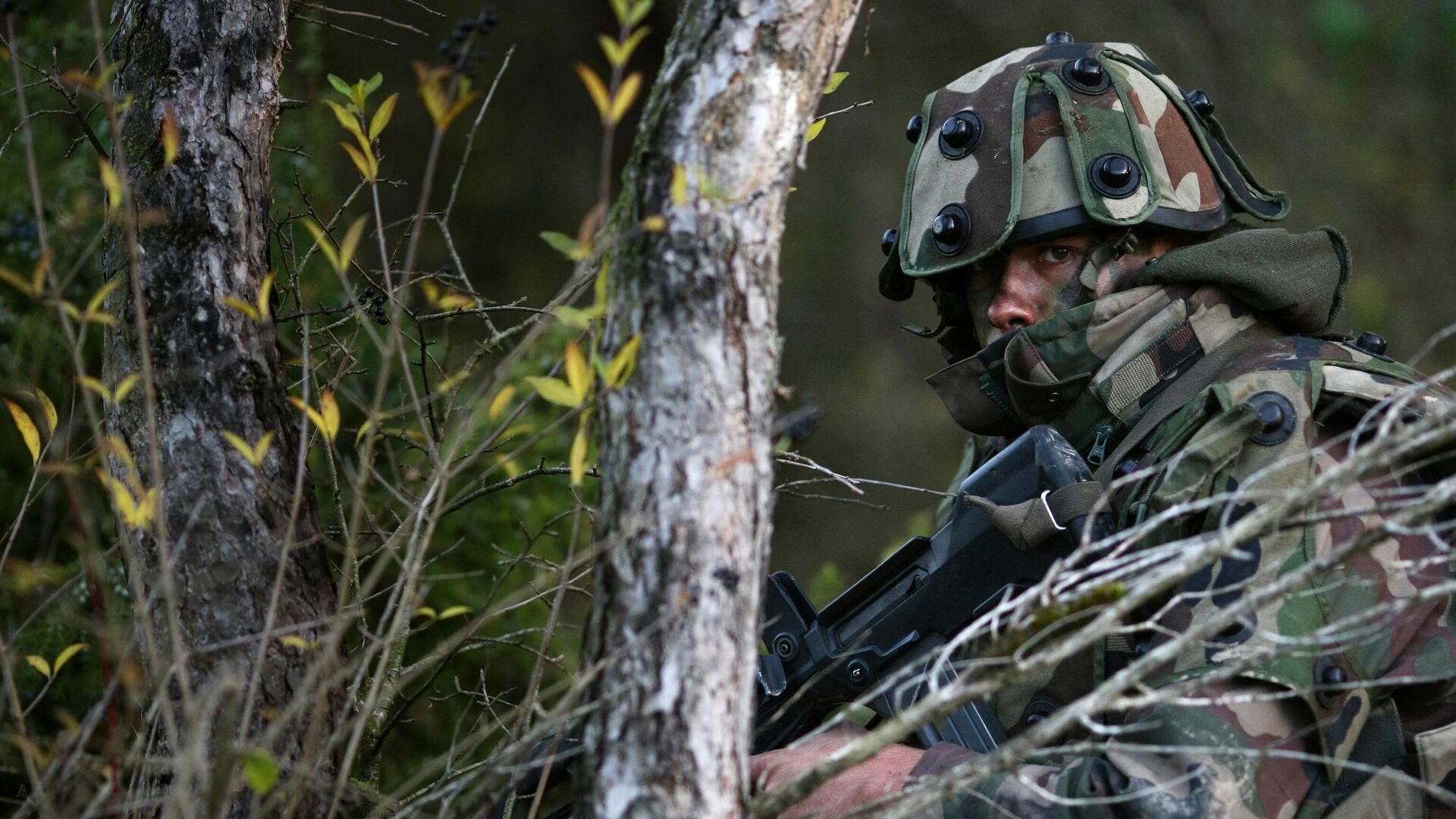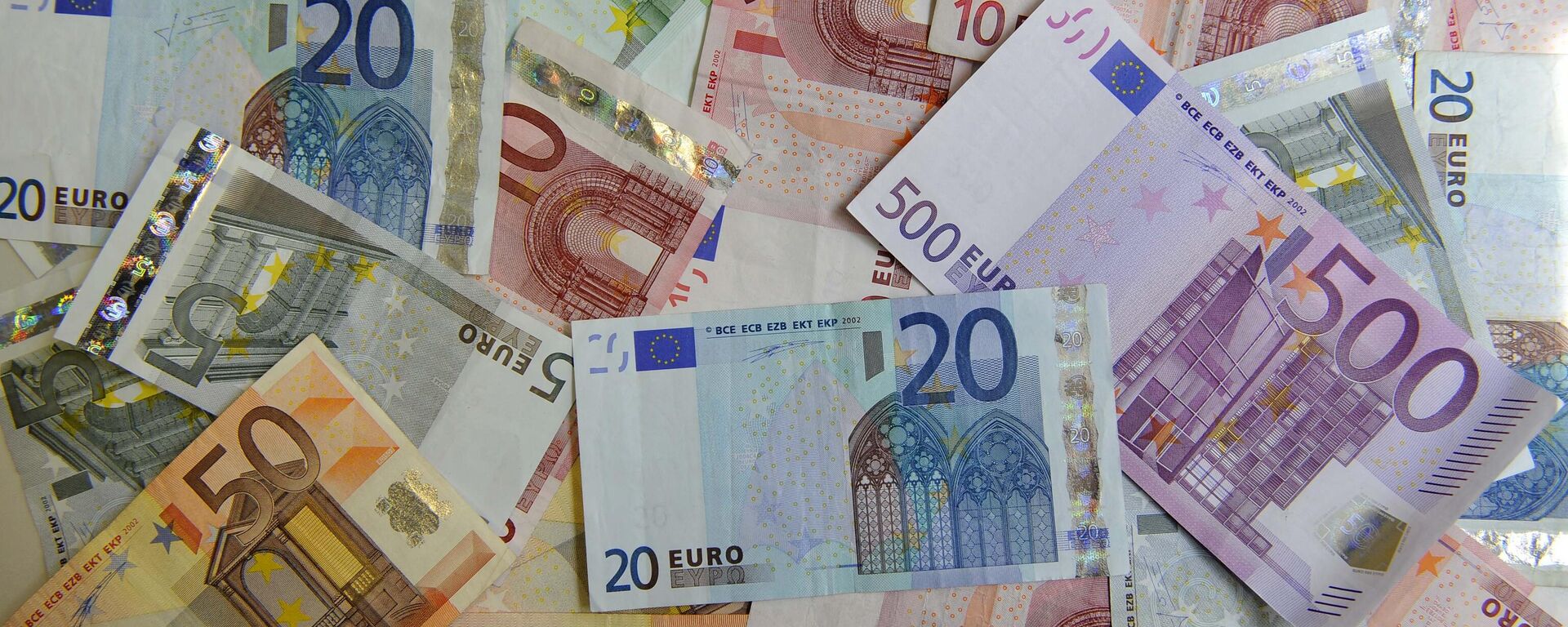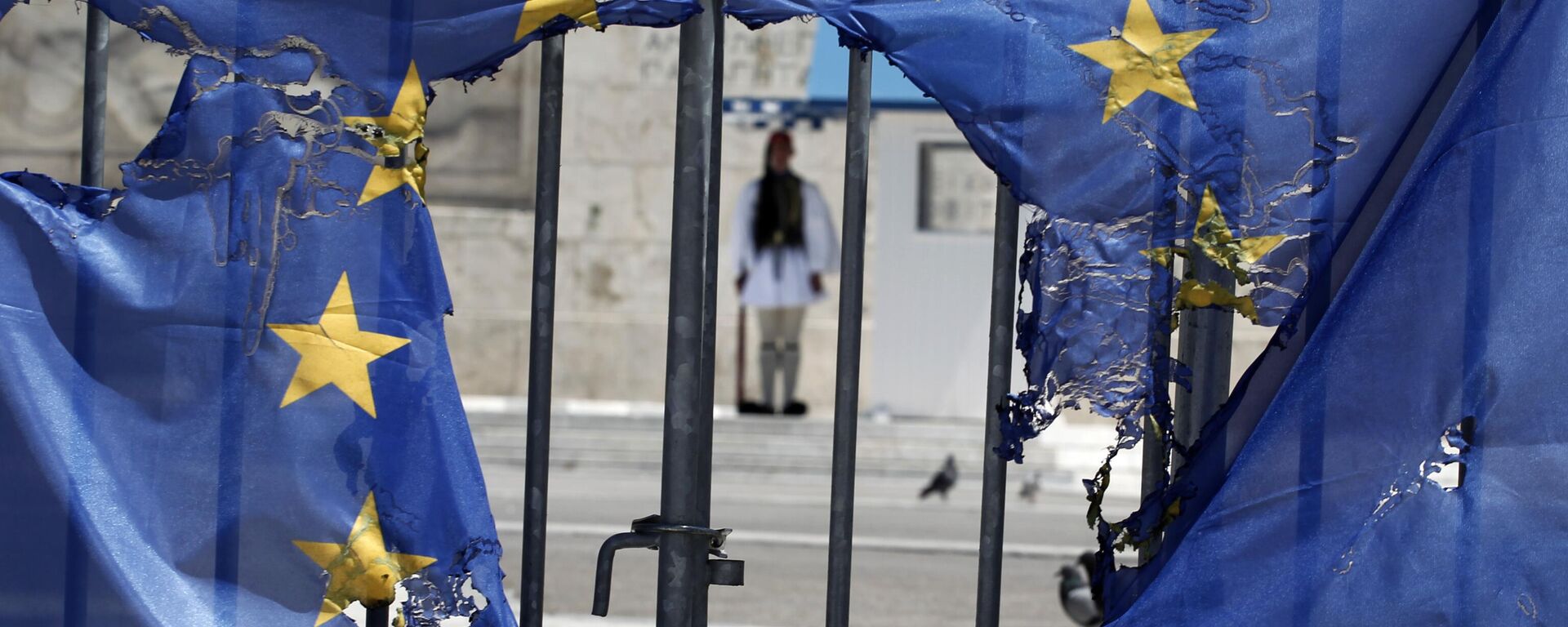https://sputnikglobe.com/20240323/militaristic-revolution-in-the-eu-brussels-paves-legal-way-for-warmongering-1117512959.html
Militaristic Revolution in the EU: Brussels Paves Legal Way for Warmongering
Militaristic Revolution in the EU: Brussels Paves Legal Way for Warmongering
Sputnik International
During the last few days, the European Union went through a real militaristic revolution. A special “legal task force” is working on allowing the use of EU funds for war.
2024-03-23T19:04+0000
2024-03-23T19:04+0000
2024-03-23T19:21+0000
europe
brussels
european union (eu)
world
https://cdn1.img.sputnikglobe.com/img/07e8/03/09/1117219815_0:0:3072:1728_1920x0_80_0_0_f63130daac471636693dc20d5191cb57.jpg
The so-called European Peace Facility (EPF), officially stewarded by Josep Borrell, will get its money from the EU funds (and not individual states) after reporting the transfer of thousands of weapons systems to Kiev. EPF also reported having trained more than 40,000 Ukrainian military to use them.The Financial Times chose a somewhat routinely sounding lead for its story on the EU’s decision to legally stop being an “oasis of peace”: “Brussels proposes ‘legal task force’ to explore ways to use the common budget for defense.”The headline, however, was more disturbing: “EU looks to bypass treaty ban on buying arms to support Ukraine.”The reality described in the FT’s story, however, is more dramatic than the headline and the lead taken together: the European Union, which was conceived as an entirely peaceful organization, becomes one of the world’s most implacable warring empires – by law. Very soon the EU’s Union Treaty will no longer have a provision prohibiting “any expenditure arising from operations having military or defense implications.” (Article 41, point 2 of the Treaty on European Union.) Or, at best, this provision will be made devoid of legal force by some new additions to the EU’s legislation.FT reports, confirming its story by eyewitness accounts, that the European Commission is creating a “legal task force,” that would allow the EU to finance wars and military production by European money. In all likelihood, the first “beneficiary” of this financing will be NATO’s proxies in Ukraine, waging a war against Russia and Russians since 2014.At a recent conference of the EU’s 27 members in mid-March, 2024, it was decided to create within the framework of the so-called European Peace Facility (EPF) a special fund for financing Ukrainian armed forces (Ukraine Assistance Fund). What the relation is between the word “peace” and the system of buying and transporting weapons to the zone of conflict, remains unclear.Ukraine Assistance Fund (UAF) will be financed by donations from EU member states to the tune of €5 billion a year. At least €500 million from that sum will be spent on training Ukrainian servicemen to use the EPF-provided weapons. The weapons will mostly be European-made (such was the requirement of France), but not only. Weapons from “third countries” can be bought and sold, creating opportunities for the spread of dangerous weapons around the world.Judging by the recent EU summit on Thursday, which discussed the ways of stealing “immobilized” Russia’s foreign assets and pouring its money into the UAF “for military support to Ukraine,” no law is an obstacle for the EU’s “legal task forces.”Was such an evolution of the EU unexpected?Not entirely. The EU’s quasi-pacifist image started to crumble not now, but back in the 1990s. It transpired back then that the real European Union went a long way from the lofty ideas of the EU’s founders. Only naïve people can trust the EU’s claims, that it is a purely “soft power-based institution.”In 1995-1999 the EU’s member countries participated in military interventions against the former Yugoslav republics, later almost all EU members made their “military contributions” to the occupations of Afghanistan, Iraq and Libya.However, as more and more “crusades” by individual Western countries or American-British alliances ended in defeats (one can cite Afghanistan in 2001-2021 or the French intervention in West Africa after the coup in Libya in 2011), the dreams about a “collective war chest” of the EU started to take shape.In 2020 the so-called European Defense Fund (EDF) and later, in March 2021, the European Peace Facility (EPF) started operating at the EU level. Their aim was clear from the start: to collect money from member countries and to buy arms for this money. Later, these weapons will be used against “undemocratic” countries, whose leaders happen to be at odds with the EU and the US.Real European pacifists immediately smelt the rat and protested both against EDF and especially against EPF, which after the escalation of the Ukrainian conflict became one of the main sponsors of Zelensky’s military machine. Back in 2021, 40 pro-peace NGOs, headed by the German group Brot für die Welt (Bread for the World) came out with a statement denouncing the EPF as an instrument “which brings arms into wrong hands” and “allows to use the EU money to train the military cadres for dictatorial regimes.”Now, however, Brussels uses widespread anti-Russian prejudice in the EU, as well as constant reminders about the "threat from Putin” to justify the final destruction of the dream of “peaceful Europe,” which once inspired the pioneers of European integration. In comparison to 2021 critics are fewer and quieter. In this way, Russophobia was spiritually destructive for Europe, stealing its dream of “world peace.”
https://sputnikglobe.com/20240322/there-is-no-way-for-eu-to-replace-us-funding-ukraine-without-tanking-euro-economy-1117480522.html
https://sputnikglobe.com/20240308/european-vassal-states-mull-arms-production-as-biden-leads-continent-to-destruction-1117198145.html
brussels
Sputnik International
feedback@sputniknews.com
+74956456601
MIA „Rossiya Segodnya“
2024
Dmitry Babich
https://cdn1.img.sputnikglobe.com/img/07e8/02/0e/1116778495_0:120:720:840_100x100_80_0_0_9bf47040bc46073fb920d272be7bc29d.jpg
Dmitry Babich
https://cdn1.img.sputnikglobe.com/img/07e8/02/0e/1116778495_0:120:720:840_100x100_80_0_0_9bf47040bc46073fb920d272be7bc29d.jpg
News
en_EN
Sputnik International
feedback@sputniknews.com
+74956456601
MIA „Rossiya Segodnya“
Sputnik International
feedback@sputniknews.com
+74956456601
MIA „Rossiya Segodnya“
Dmitry Babich
https://cdn1.img.sputnikglobe.com/img/07e8/02/0e/1116778495_0:120:720:840_100x100_80_0_0_9bf47040bc46073fb920d272be7bc29d.jpg
europe military aid to ukraine, europe weapons to ukraine
europe military aid to ukraine, europe weapons to ukraine
Militaristic Revolution in the EU: Brussels Paves Legal Way for Warmongering
19:04 GMT 23.03.2024 (Updated: 19:21 GMT 23.03.2024) During the last few days, the European Union went through a real militaristic revolution. A special “legal task force” is working on allowing the use of EU funds for war.
The so-called
European Peace Facility (EPF), officially stewarded by Josep Borrell, will get its money from the EU funds (and not individual states) after reporting the transfer of thousands of weapons systems to Kiev. EPF also reported having trained more than 40,000 Ukrainian military to use them.
The Financial Times chose a somewhat routinely sounding lead for its story on the EU’s decision to legally stop being an “oasis of peace”: “Brussels proposes ‘legal task force’ to explore ways to use the common budget for defense.”
The headline, however, was more disturbing: “EU looks to bypass treaty ban on buying arms to support Ukraine.”
The reality described in the FT’s story, however, is more dramatic than the headline and the lead taken together: the European Union, which was conceived as an entirely peaceful organization, becomes one of the world’s most implacable warring empires – by law. Very soon the EU’s Union Treaty will no longer have a provision prohibiting “any expenditure arising from operations having military or defense implications.” (Article 41, point 2 of the Treaty on European Union.) Or, at best, this provision will be made devoid of legal force by some new additions to the EU’s legislation.
FT reports, confirming its story by eyewitness accounts, that the European Commission is creating a “legal task force,” that would allow the EU to finance wars and military production by European money. In all likelihood, the first “beneficiary” of this financing will be NATO’s proxies in Ukraine, waging a war against Russia and Russians since 2014.
At a recent conference of the EU’s 27 members in mid-March, 2024, it was decided to create within the framework of the so-called European Peace Facility (EPF) a special fund for financing
Ukrainian armed forces (Ukraine Assistance Fund). What the relation is between the word “peace” and the system of buying and transporting weapons to the zone of conflict, remains unclear.
Ukraine Assistance Fund (UAF) will be financed by donations from EU member states to the tune of €5 billion a year. At least €500 million from that sum will be spent on training Ukrainian servicemen to use the EPF-provided weapons. The weapons will mostly be European-made (such was the requirement of France), but not only. Weapons from “third countries” can be bought and sold, creating opportunities for the spread of dangerous weapons around the world.
Judging by the recent EU summit on Thursday, which discussed the ways of stealing
“immobilized” Russia’s foreign assets and pouring its money into the UAF “for military support to Ukraine,” no law is an obstacle for the EU’s “legal task forces.”
Was such an evolution of the EU unexpected?
Not entirely. The EU’s quasi-pacifist image started to crumble not now, but back in the 1990s. It transpired back then that the real European Union went a long way from the lofty ideas of the EU’s founders. Only naïve people can trust the EU’s claims, that it is a purely “soft power-based institution.”
In 1995-1999 the EU’s member countries participated in military interventions against the former Yugoslav republics, later almost all EU members made their “military contributions” to the occupations of Afghanistan, Iraq and Libya.
However, as more and more “crusades” by individual Western countries or American-British alliances ended in defeats (one can cite Afghanistan in 2001-2021 or the French intervention in West Africa after the coup in Libya in 2011), the dreams about a “collective war chest” of the EU started to take shape.
In 2020 the so-called European Defense Fund (EDF) and later, in March 2021, the European Peace Facility (EPF) started operating at the EU level. Their aim was clear from the start: to collect money from member countries and to buy arms for this money. Later, these weapons will be used against “undemocratic” countries, whose leaders happen to be at odds with the EU and the US.
Real European pacifists immediately smelt the rat and protested both against EDF and especially against EPF, which after the
escalation of the Ukrainian conflict became one of the main sponsors of Zelensky’s military machine. Back in 2021, 40 pro-peace NGOs, headed by the German group Brot für die Welt (Bread for the World) came out with a statement denouncing the EPF as an instrument “which brings arms into wrong hands” and “allows to use the EU money to train the military cadres for dictatorial regimes.”
Now, however, Brussels uses widespread anti-Russian prejudice in the EU, as well as constant reminders about the "threat from Putin” to justify the final destruction of the dream of “peaceful Europe,” which once inspired the pioneers of European integration. In comparison to 2021 critics are fewer and quieter. In this way, Russophobia was spiritually destructive for Europe, stealing its dream of “world peace.”





